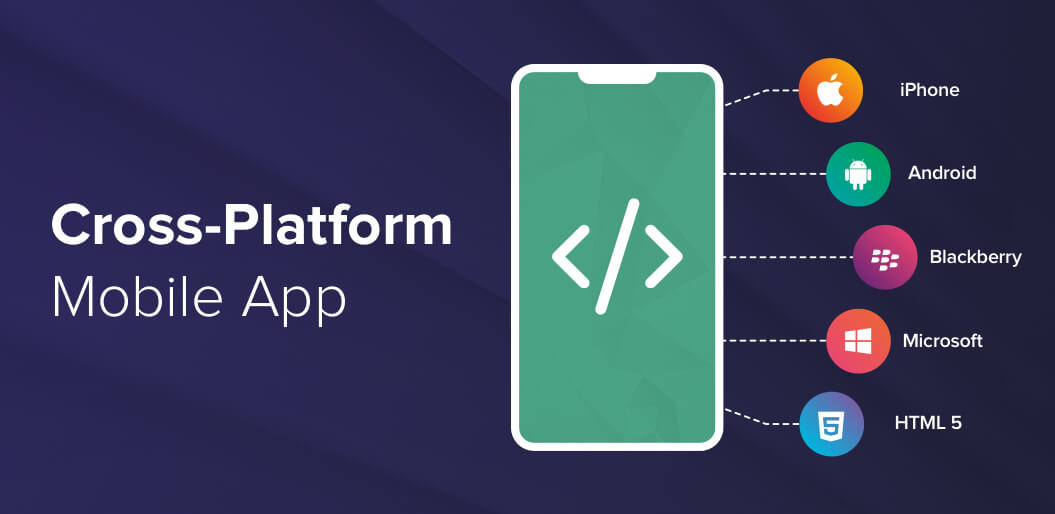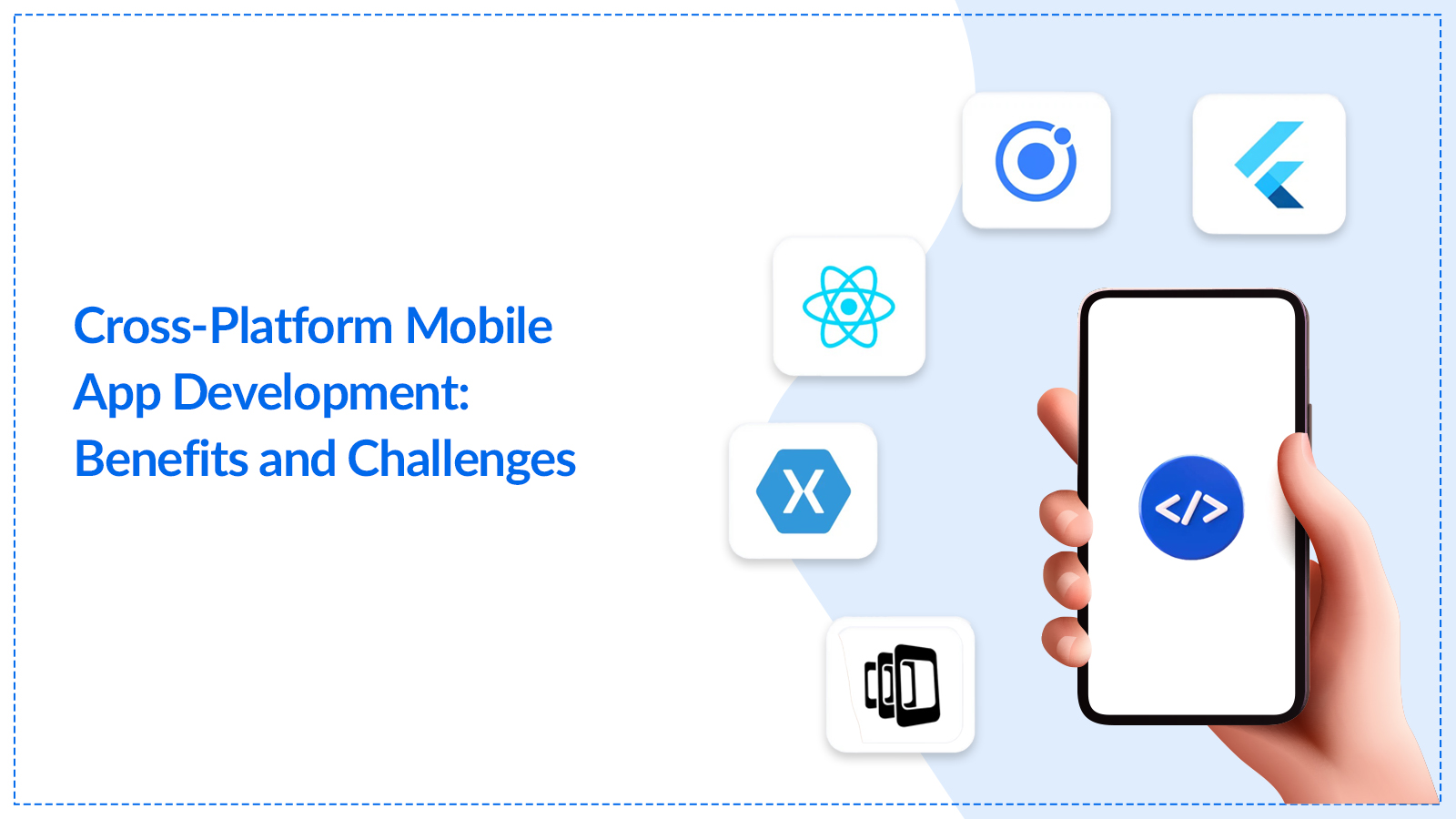The importance of mobile applications has grown among both organisations and individual businesses. With platforms like iOS and Android, developing apps for each one can be time-consuming and costly. Cross-platform application development comes in at that point. This is where developers make applications for more than one platform with the assistance of one template code thus shortening the time frame in the process. Since it is less expensive, it also helps to get a larger audience. In this blog, we’ll look into the advantages as well as the drawbacks that come with developing cross-platform mobile apps.
This blog article has been written by Mubasshir Pawle, who is very passionate about technology, explaining the lessons learned over a period of mobile application development. The blog focuses on assisting developers and businesses on the benefits of cross-platform app development and its challenges, especially in India.
Benefits of Cross-Platform App Development

1. Cost-effectiveness
Cross-platform mobile app development comes with several advantages, one of which is its cost efficiency.
Today, mobile phone apps on devices such as Android, iOS, Windows etc, can be developed from the same code base for many reasons. This is especially essential for small businesses and startup companies in India, where a lot of expenditure is involved and everything has a budget.
2. Faster Time-to-Market
Developing cross-platform apps leads to faster time-to-market.
- Companies do not need to source and coordinate separate development teams for each platform; they can operate with a single codebase.
- This accelerates the development process, and hence, the product is ready to be launched earlier than necessary.
- Earlier time of launch can help businesses pull up their socks in India’s ever changing business environment.
3. Wider Reach
Cross-platform mobile application development allows businesses to focus at once on providing apps for different platforms. This is a very important factor for businesses looking to enter the Indian market as both iOS and Android users are present, and they are partitioned in large volumes.
4. Code Reusability
Moreover, a great benefit associated with the development of cross-platform applications is code reusability.
- Developers don’t need to write different code for different platforms; they can write a code and implement it on all platforms.
- This not only reduces time but also guarantees similar performance and features on different platforms.
- Therefore development fatigue caused by overlapping code development is reduced, enabling the same look and feel to the end users.
5. Simplified Maintenance
When a company has to support multiple versions of the same app, the developers have to support a multitude of codebases, which is tedious.
Cross-platform development simplifies maintenance as there is only one codebase to update and fix bugs. Enhancements and updates can be deployed at once across all devices, so user satisfaction and the overall quality of the name can be enhanced.
6. Consistent UI/UX
Cross-platform frameworks, like React Native and Flutter, top the list of assisting in maintaining the app’s UI and UX across platforms. Consistency helps build brand recognition and provides users with a seamless experience, regardless of the device they use.
7. Resource Optimisation
Multiplatform mobile app development helps the business’s management to make effective use of resources. This assists in improving overall productivity as the developers are able to work on enhancing the app’s features instead of working on different versions of the app.
8. Access to a Larger Talent Pool
As professional cross-platform mobile applications become more and more popular, the number of mobile app development companies increases. This helps businesses save time looking for only one kind of developer as it is easier to hire rather than people qualified in one platform.
9. Streamlined Updates
Cross-platform apps can be updated more efficiently since changes only need to be made in a single codebase. This streamlines the process of rolling out updates and new features across all platforms, improving user experience.
10. Third-party Integration
Cross-platform development allows for smoother integration with third-party tools and services, helping businesses incorporate essential features such as analytics, customer support, and payment gateways without platform-specific limitations.
Challenges of Cross-Platform App Development

1. Performance Limitations
Due to the use of additional frames separating the code from the OS, cross-platform apps may not be able to achieve the efficiency of native apps. Such performance gaps are more prevalent in applications which require a lot of processing power, especially games or graphic-rich applications.
2. Limited Access to Platform-Specific Features
Each mobile platform comes with its own features and functionalities. This may limit the ability to obtain these specific features when developing cross-platform apps.
For instance, iOS and Android push-over notifications abilities are scratched very differently, and the cross-platform tools may not provide for these differences completely.
3. Steeper Learning Curve
Cross-platform development requires developers to learn new tools and frameworks like React Native, Flutter, or Xamarin. This may pose a huge challenge especially to developers who are used to working on native platforms.
This harmonisation of the frameworks will not take just a day and organisations may have to spend more on training their developmental teams.
4. Fragmentation
- There is also a wide array of the types and sizes of mobile devices and the types of operating systems they carry.
- This fragmentation can make it challenging for developers who want to develop cross-platform apps because they need to make sure that their apps are usable across different screen sizes, resolutions, and operating systems.
- It can be quite a lengthy process with regard to ensuring device compatibility and optimisation parameters as well.
5. Complex Debugging
Debugging cross-platform applications can be more complex than native apps due to the abstraction layer between the code and the device. Issues may arise in the framework, making it difficult to identify and resolve the root cause.
6. Limited Native Functionality
Cross-platform strategies and frameworks have greatly evolved, but they still cannot compete with traditional development methods in providing native functionality. This limitation can severely impact the application.
7. Potential UI/UX Inconsistencies
Bringing about this cross-platform goal and tools is ideal, but when it comes to achieving the unbeatable perfect UX/UI across all the platforms, it becomes a huge challenge.
Each platform has its own design language, and tailoring the app to meet the specific requirements of both iOS and Android can become challenging.
8. Security Concerns
Developers may face more security concerns in cross-platform apps due to the intricacy of coming up with a single code base. Ensuring that security standards are met across different platforms requires additional effort, and developers must be extra cautious when implementing security features.
9. Framework Limitations
Cross-platform frameworks come with their own advantages and disadvantages.
- For instance, some of the components of Flutter for development may not work with iOS native devices, and some restrictions may be experienced on Android with React native components.
These restrictions have to be carefully considered by the businesses before they settle on a framework.
10. Ongoing Maintenance Costs
The development of cross-platform apps may land businesses to lower costs at first, but over time maintenance will cost more. Developers need to keep track of updates for both the framework and the underlying platforms, which can add to the long-term costs.
Also read: How to Choose the Right Mobile App Development Company for Your Business
Conclusion
Cross-platform mobile app development offers a variety of benefits, such as cost-effectiveness, faster time-to-market, and a wider reach. In India, cross-platform application development is particularly useful for start-ups and small investing companies, but it is necessary to take into account all the pros and cons.
Moreover, you will have to look out for good mobile app development companies, which are listed on platforms like App Development Companies. However, this process, too has limits in performance, fragmentation of data and network space, and accrued limits on the functionality of the platform, which are not specific.
FAQs
Cross-platform app development involves creating a single app that works across multiple platforms, such as iOS and Android, using a single codebase.
Popular frameworks include React Native, Flutter, and Xamarin.
The main benefits include cost-effectiveness, faster time-to-market, and code reusability.
Challenges include performance limitations, limited access to platform-specific features, and device fragmentation.
Cross-platform development is ideal for apps with general functionality, but apps requiring high performance or access to specific hardware features might benefit more from native development.


